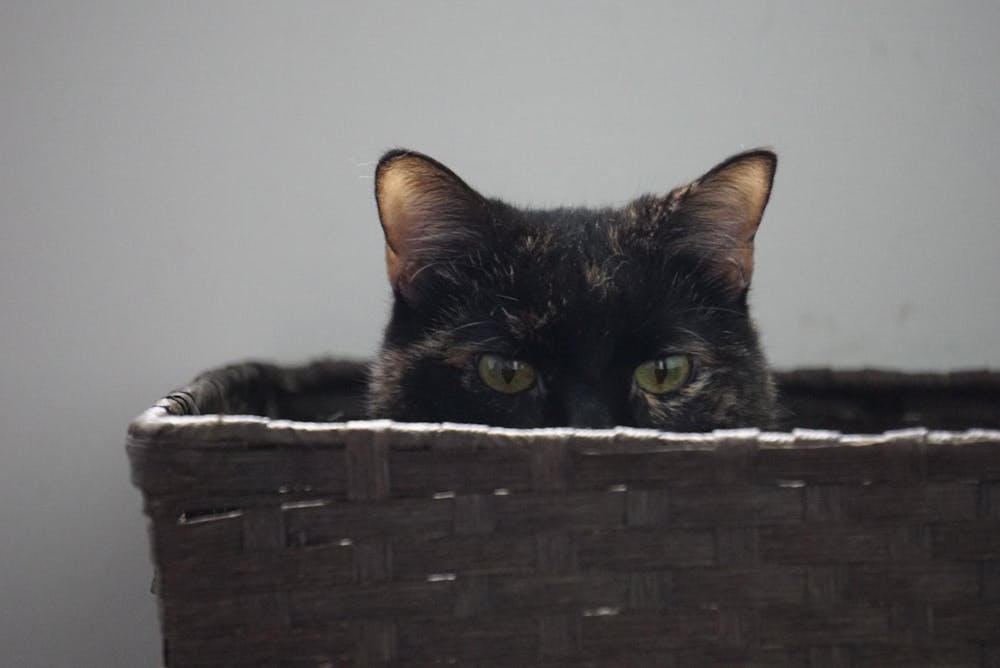Owning a pet can enhance a student's college experience, according to some students. The best part about owning a pet is having a best friend, said third-year advertising student Amy Garza, who looks forward to seeing her puppy after classes or a workday.
“It gives you a partner to do things with, kind of like a best friend,” Garza said.
Third-year French student Brayden Jones, who owns two cats, said his favorite part of owning pets is being able to learn about their behaviors and habits. Brayden Jones said when he got his second cat, he noticed changes in his first cat's behavior.
“It’s almost like how you pick up phrases from a friend. They pick up habits from each other,” Brayden Jones said. “And that’s the fun part of it, seeing what they like to do.”
The responsibility of owning a pet helps to keep fourth-year hospitality management student Sileena Rishmawi calm and motivated. Rishmawi said taking care of her cat Pluto helps her wake up each morning.
“It gives me the responsibility to take care of him and also myself,” Rishmawi said. “Making sure he has everything and making sure his litter box is clean makes me want to clean everything of mine.”
Balancing college life and taking care of a pet is a big task that can cause challenges for busy students. Garza said owning a puppy in college affects her daily schedule.
“A lot of times, when I would normally hang out with friends, I have to stay home a little extra long to make sure he’s okay,” Garza said. “I had to put a lot of time throughout my day in training him.”
Brayden Jones said balancing his college schedule and pet ownership requires him to think more about time management.
“During the summer, the feeding times would be more sporadic,” Brayden Jones said. “Versus now, it’s more so they can’t get fed until a certain time.”
Another challenge of owning a pet in college is the extra costs, said Rishmawi, who spends around $70 per month on her cat's food and litter.
“The only struggle would be with money,” Rishmawi said. “If I didn’t get a job last year, I probably would be struggling right about now.”
Columbia animal rescues Pawmetto Lifeline and Final Victory Animal Rescue offer foster programs for those who want to take care of a pet but might have concerns about the expenses.
Pawmetto Lifeline is a No-Kill animal rescue founded in 1999. Its mission is to prevent and reduce animal homelessness, set a standard for humane practices in pet shelters and create a No-Kill community in the South Carolina Midlands. Since the opening of the adoption, medical and boarding facility in spring 2012, the rescue has been able to save more than 24,000 animals from euthanasia.
Senior Director of Pawmetto Lifeline DeeAnn Jones recommends students between the ages of 18 and 21 foster pets. Fostering is providing a pet with a temporary home that prevents them from homelessness or being placed in a shelter.
“You learn how to take care of an animal," DeeAnn Jones said. “We found with a lot of college students that they lived in a home with an animal, but they were not the full-time caretaker.”
DeeAnn Jones said fostering a pet can give students an idea of what kind of pet parent they can be without the costs associated with full-time ownership.
“We pay for everything. So they don’t have vet bills, they don’t have food costs, they don’t have a cost for supplies,” DeeAnn Jones said. “We call that getting all the love without any of the expense.”
Final Victory Animal Rescue is a nonprofit dog and cat rescue founded in 2017. The rescue serves animals who have suffered from traumatic experiences, and aims to get them out of shelters and away from the threat of euthanasia. The organization has given thousands of pets a second chance by helping them find homes in South Carolina and across the east coast.

Kennel tech Juliana Mackiewicz, who works at Final Victory Animal Rescue, said students are the biggest demographic that the rescue serves.
“It’s mostly fostering but a lot of adopting too,” Mackiewicz said. “Or they’ll have groups of students come in, fraternities and sororities come in and do volunteer work here."
Mackiewicz said she would tell students looking to adopt a pet to really think about it first and consider fostering as an option.
"Foster definitely. You should probably foster before you adopt so you know what you're getting yourself into," Mackiewicz said. "But I would recommend it to anyone. Especially if you have pets at home or any experience with animals ... It really is the best thing ever."
Mackiwewicz said owning a pet is a beneficial experience for both students and pets.
"You get to have a little piece of home, and it gives you a sense of responsibility ... It's something to keep you in check," Mackiewicz said. "And you know that you're helping them too, so it's kind of like a balance."

